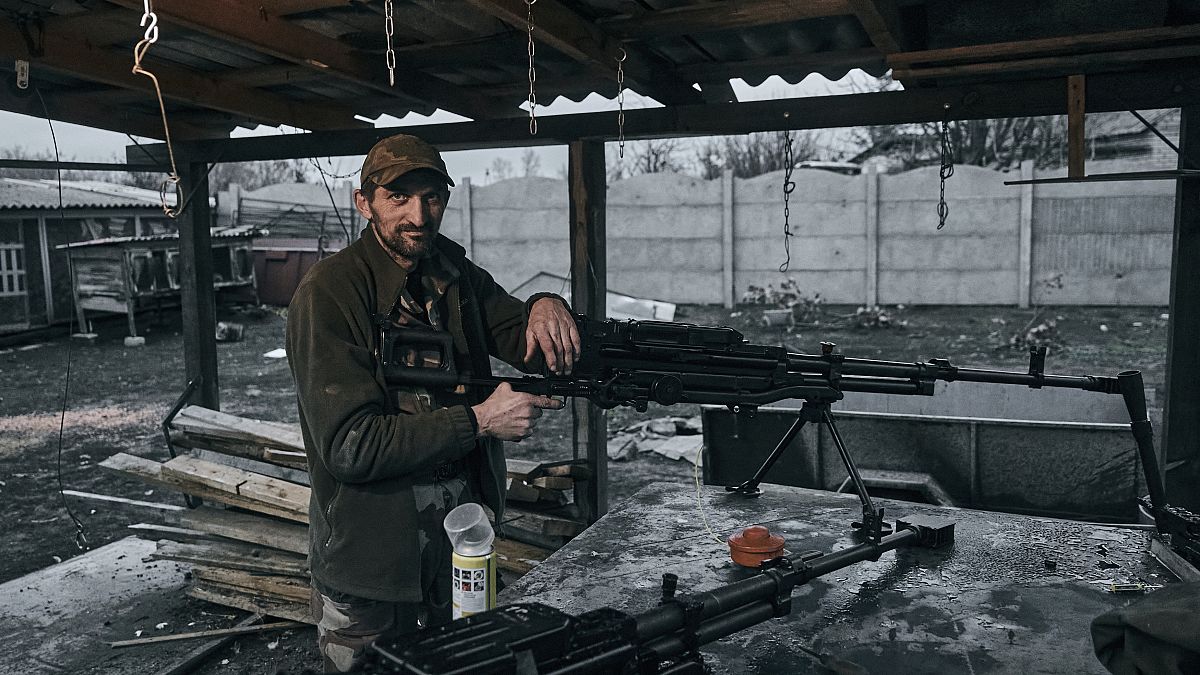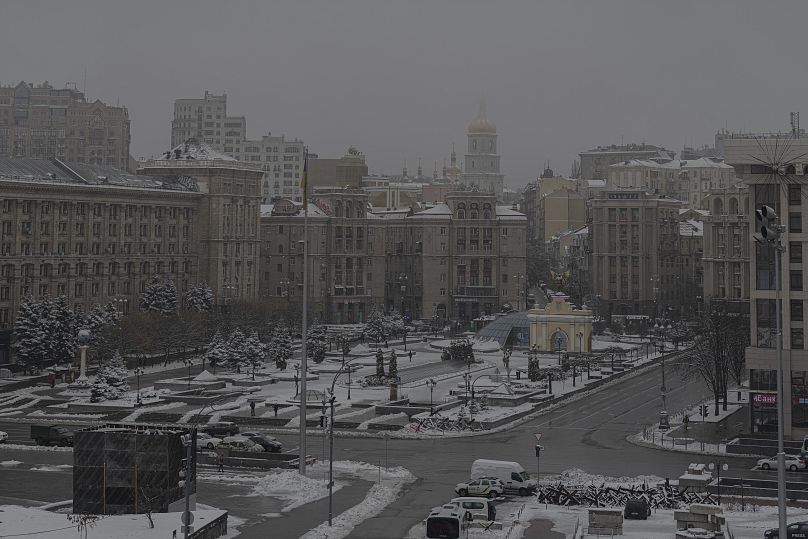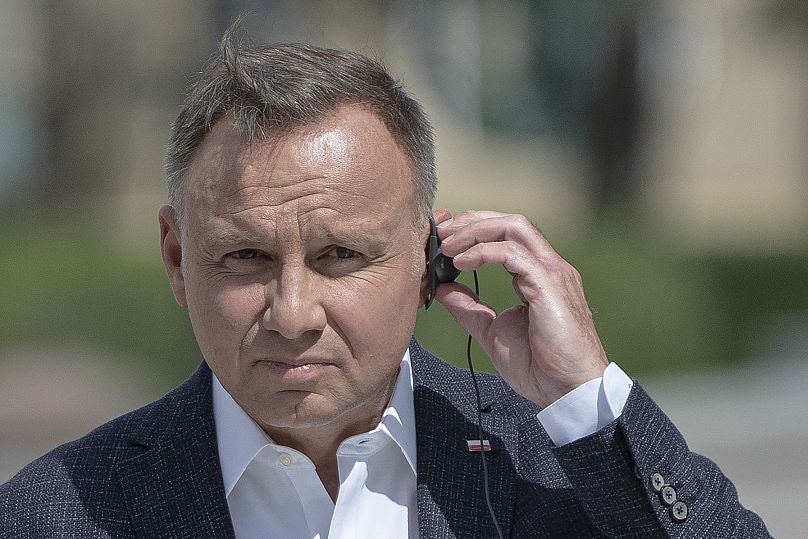Here is our summary of the latest news from Russia's war in Ukraine.
1. Ukraine searches Kyiv monastery over suspected Russia links
Ukraine's security service (SBU) has raided the main Orthodox Christian monastery in Kyiv over suspected links to Russia.
The SBU said on Telegram that it had carried out "counter-espionage measures" at the 1,000-year-old Pechersk Lavra complex on Tuesday morning.
The operation aimed to "counter the subversive activities of the Russian special services in Ukraine", it added.
The searches were carried out alongside Ukrainian police and the national guard, the SBU said. Worshippers were allowed to continue praying at the monastery but were subjected to SBU security checks.
"These measures are carried out to prevent the use [of the monastery] as a centre of the 'Russian world'," the SBU said.
The Pechersk Lavra is the oldest monastery in Ukraine and has been on the Unesco World Heritage List since 1990. It is also the headquarters of the Russian-backed wing of the Ukrainian Orthodox Church.
The Moscow branch of the Ukrainian Orthodox Church had maintained close ties to Russia until May, following the invasion of Ukraine.
Two similar raids were also conducted on monasteries and Orthodox Church properties in the northwestern Ukrainian region of Rivne.
Kremlin spokesperson Dmitry Peskov has condemned the raids as "military action against the Russian Orthodox Church".
The Russian Orthodox Church has also described the searches as an "act of intimidation".
Patriarch Kirill, the head of Russia's church, has vocally supported Russia's "special military operation" in Ukraine.
2. Ukrainians may have to live with blackouts until March
The head of a major Ukrainian energy provider has warned that citizens will likely have to live with blackouts at least until the end of March.
Sergey Kovalenko, head of the YASNO, said on Facebook that workers were rushing to complete repairs before winter arrives.
"Stock up on warm clothes and blankets and think about options that will help you wait a long outage," he said.
Half of Ukraine's energy infrastructure has been damaged by Russian attacks, according to President Volodymyr Zelenskyy.
In his nightly address on Monday, Zelenskyy also appealed to Ukrainians to conserve energy.
Amid frequent blackouts, millions of people have been left without electricity and water as winter sets in and temperatures drop below freezing. Grid operator Ukrenergo said more planned shutdowns are scheduled for Tuesday.
"The scale of destruction is colossal," said Ukrenergo CEO Volodymyr Kudrytskyi.
"In Ukraine, there is a power generation deficit. We cannot generate as much energy as consumers can use."
Kudrytskyi added that rising temperatures after Wednesday should provide an opportunity for Ukrenergo to stabilise the power-generating system.
The Ukrainian government has begun evacuating citizens from the liberated city of Kherson, which remains mostly without electricity and running water. Residents in Kherson may apply to be relocated to areas where heating and security problems are less acute.
"Given the difficult security situation in the city and infrastructure problems, you can evacuate for the winter to safer regions of the country," Deputy Prime Minister Iryna Vereshchuk said on Telegram.
Moscow says its strikes on Ukraine's energy infrastructure are the consequences of Kyiv not willing to negotiate.
Russia has been targeting Ukrainian power facilities after a series of battlefield setbacks, including its withdrawal from Kherson to the east bank of the Dnipro river.
3. Ukraine health system facing 'darkest days in the war so far', says WHO
The World Health Organization's regional director to Europe has issued a stark warning after visiting Ukraine.
Up to three million more people could leave their Ukrainian homes this winter in search of warmth and safety, according to Hans Kluge.
"Ukraine's health system is facing its darkest days in the war so far," Kluge said in a statement.
"Having endured more than 700 attacks, it is now also a victim of the energy crisis. Access to healthcare cannot be held hostage," he added.
The WHO says hundreds of Ukrainian hospitals and healthcare facilities lacked fuel, water, and electricity to meet people's basic needs.
"We expect 2-3 million more people to leave their homes in search of warmth and safety," Kluge said.
"They will face unique health challenges, including respiratory infections such as COVID-19, pneumonia, influenza, and the serious risk of diphtheria and measles in the under-vaccinated population."
The UN health agency has called for a “humanitarian health corridor” to be created for all areas of Ukraine that have been recaptured by Kyiv, as well as those occupied by Russian forces.
4. Kherson official arrested on suspicion of 'treason'
Ukrainian investigators said they have arrested a Russian pre-trial detention centre official in Kherson for "treason".
The suspect is accused of allowing Russian prisoners of war to escape before the city was recaptured by Kyiv.
"From the very first days of the occupation, this employee of a detention centre worked for the invaders," the SBU said in a statement.
"[They were] in charge of pre-trial detention centres and places of execution of sentences," it added.
According to the SBU, the suspect "did not have time to escape" when Kyiv's forces liberated the southern city on November 11. If convicted of treason, the suspect faces a life sentence in prison.
The arrest comes after Ukrainian prosecutors say they have found four "torture sites" used by the Russian forces in Kherson.
Earlier this month, the SBU also arrested a suspected Russian soldier who was allegedly "disguised as a civilian" in Kherson.
Fighting continues to rage on the ground in eastern Ukraine, where Russia has mobilised its forces from Kherson.
The General Staff of the Ukrainian Armed Forces said on Tuesday that it had repelled numerous Russian attacks in several areas in the Donetsk region.
"The enemy does not stop shelling the positions of our troops and settlements near the contact line," it claimed. "Attacks continue to damage critical infrastructure and civilian homes."
Four people were killed and four others wounded in Ukraine-controlled areas of the Donetsk region over the past 24 hours, regional governor Pavlo Kyryleno said on Telegram.
Russian missiles also reportedly hit a humanitarian aid distribution centre in the Zaporizhzhia town of Orihiv, killing one person and injuring two others.
The strike allegedly occurred near Zaporizhzhia nuclear power station, according to regional governor Oleksandr Starukh. Russia and Ukraine have both accused each other of firing shells near the plant.
Authorities in the Russian border region of Belgorod have also claimed that three people were killed in strikes on Tuesday.
5. Poland's President spoke to Russian pranksters after missile explosion
The office of Polish President Andrzej Duda has confirmed that he spoke to Russian pranksters after last week's deadly rocket strike.
Duda’s office confirmed on Tuesday that last week he was put through to a person claiming to be French President Emmanuel Macron and that he gave the caller sensitive information.
Two people were killed by a rocket blast in the Polish border village of Przewodow on November 15. NATO Secretary General Jens Stoltenberg has said that the missile appeared to have been fired accidentally by Ukraine's air defences.
A seven-minute video on YouTube shows two Russian pranksters -- known as Vovan and Lexus -- speaking to Duda in an apparent French accent.
The Polish President can be heard explaining details about the missile incident and his care not to exacerbate the situation with Russia.
Duda's office says the prank call was one of many conversations that he had received just after the rocket strike.
"During the call, President Duda realised from the unusual manner in which the caller was conducting the call that there may have been an attempt to deceive and ended the call," the office wrote on Twitter.
The same Russian pranksters had previously spoken to Duda in 2020 while posing as UN secretary-general Antonio Guterres. Two officials from Poland’s mission to the UN were dismissed over the incident.
An investigation into the latest prank call is underway, Duda's office said.
Vovan and Lexus have previously targeted other European politicians and celebrities with prank calls, including UK defence minister Ben Wallace.
Poland's defence minister says the country will now deploy additional Patriot missile launchers from Germany near the Ukrainian border.
Berlin had offered the air defence system to help Warsaw intercept missiles after last week's deadly strike in Przewodow, which had raised fears that the Ukraine war could spill into NATO territory.
"The German defence minister confirmed her willingness to deploy the Patriot launcher at the border with Ukraine," Polish minister Mariusz Blaszczak wrote on Twitter.
"The version of the system remains to be determined, as does how quickly they will reach us and how long they will be stationed."
The NATO allies had already said that German Eurofighters would offer to help police Polish airspace.
6. Ukraine receives new EU aid worth €2.5 billion
Ukraine's government says it has received a new €2.5 billion financial aid package from the European Union.
Finance Minister Serhiy Marchenko said the bloc had now provided €6.7 billion of assistance to Kyiv since Russia invaded.
"The EU Commission is disbursing a further €2.5 billion for Ukraine," Commission President Ursula von der Leyen wrote on Twitter.
"We are planning €18 billion for 2023, with funding disbursed regularly for urgent repairs and fast recovery leading to a successful reconstruction," she added.
"We will keep on supporting Ukraine for as long as it takes."
Ukraine's President Zelenskyy said on Twitter that he was "grateful" for the new tranche of aid ahead of the winter.
Prime Minister Denys Shmyhal added that the assistance was "another step of solidarity".
The international community has also stepped up its aid to Moldova amid an energy crisis.
On Tuesday, the Russian gas giant Gazprom threatened to cut gas supplies to Moldova, accusing Ukraine of siphoning off the pipeline that runs through its territory.
According to Gazprom, Ukraine illegally accumulated 52.5 million cubic metres of gas in November by "violating" part of the deliveries to use it for its own purposes.
The Russian giant threatened to "reduce gas supplies" from November 28, as temperatures plummet and the demand for gas increases.
Russia was the EU's biggest supplier of gas before the invasion of Ukraine, but the EU has since cut its imports significantly to less than 10% of all imported gas.


